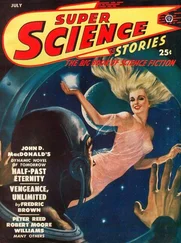“I need you,” I said. “I need to come and talk to you. I get shaky and then I need to come and...”
She took her hand away. “Now listen! How can you be so goddamn dumb? This was a gag. Get it? Wilma had fun. So did you. Now Wilma is bored. With you and with the gag. You just aren’t good company, Gil. You haven’t any conversation and damn few manners and you go around preening yourself and flexing your muscles. I’m throwing you off my back. If you’re smart, you’ll find a nice clean counter and get behind it and put on a monkey hat and start making with the cheese on rye.”
She left me there. I saw her down on the dock. She was laughing with Steve. They were laughing at me. I knew it. I was nothing and they had made me into something and now they were making me back into nothing again. I sat up there and I was empty. I was like a figure you could make out of twisting wire coat hangers so they were the outline of a man. You could see through me. See the stars and the lights and everything. And sounds went right through me, and the tiny breeze that there was, up high where I sat.
And right in the middle of all the wire a little round thing started to grow. Round and solid and shining. It grew and grew until it filled up all the wire and then I was me again and I wanted to laugh out loud. The best part of the joke was on her.
They put it up on the cork board. It was on thick white paper and they put it up with four yellow thumbtacks, one in each corner. I drew every leaf. It took me hours. Every single little leaf, and each leaf had five little points. One day it was gone and I asked, but nobody knew what had happened to it. I wanted to do it all over again, but there wasn’t time. Because by then we were planting the garden. I hated the garden. I worked all one day, squashing each seed between my fingers when I put it down in the hole I made with the stick. Nothing grew there.
She had thought she had made me. I had made myself. But I could see the danger, even in that. The danger of her mouth. The laughing of it. And others laughing. The way they were laughing down there. I could not permit that. I could not allow it.
I stood up and felt tall. I felt that my shoulders were against the sky. I looked around. The light reflection was dim on the croquet wickets, on the striped posts. I walked over, and my body felt as if it were made of leather and springs, tireless. I pulled the post from the ground. It was hard wood, striped in gay paint, and the end that went into the ground was capped with brass that ended in a sharp point.
The wood was hard. I held the post in both hands close to my chest. I increased the effort slowly. My shoulders made popping sounds. The muscles of my arms creaked. My throat closed and the world darkened and my hands were bright with pain. It had to happen, or nothing would happen. This had to be true or nothing would happen. This had to be true or nothing would be true.
And the hard maple made a faint crackling sound and then broke sharply and I fell to my knees in the sudden weakness, my ears ringing, the depths of my lungs burning. In my left hand I held the turned brass tip, with four or five inches of the glossy wood attached. I threw the rest of the post behind me as I stood up, heard it roll and clatter on the gravel. I tucked the small end in the waistband of my trunks. The brass was cool against my belly.
It had broken and I was strong and important and known to myself. Whole again and significant. I went down to them and laughter was something that ran gaily around in my chest, little running silver bits, like spilled mercury. I went down among them. It was significant that I went down from a high place where I had proved my strength in the lights. Sister Elizabeth had read the pagan myths to us, of the ones on Olympus who, for amusement, coldly and without compassion, would go down to play among the mortals, concealing the godhead, concealing the shining uniqueness the way the striped bit of wood capped with brass was hidden from them. It was hidden because it was proof of strength they could not know, and if I displayed it openly they would look too knowingly at me and be ashamed. I was grateful to Wilma because she had made it necessary to undergo the trial of strength, the final proof.
I swam with them, careful not to lose the symbol. It was enough to know that it was there. And I found that I could talk with them cleverly, so that they knew nothing. That was enough. It pleased me.
When at last, after a long time, we swam in naked darkness, I swam with the symbol of strength in my hand. I played their childish games because it pleased me to do so.
And then there came a time when I was beside Wilma, stars pale on her body in the black water. And the meaning of many things was revealed to me. It was a new secret I had discovered, a new measure of my growth. It’s something you must learn to do, and it’s hard. You must open your mind to a blankness, and then what you must do will be told to you.
I felt a great tenderness toward her. A gratitude, because she was making this possible for me. She became a part of the design, and once it was unfolded, it was so evident that I wondered why I had not seen it before. It fitted together. It was an art form in which I had not worked before and the laws of the form were rigid. If it were not done to precise ritual, it would all be spoiled. Out of my strength and importance flowed the plan and I felt humble. It was an honor for her that she could share this uniqueness, share it as a mortal proving her mortality.
She swam slowly and, beside her, holding the symbol of strength in my right hand, I slid my left hand under her arm lightly across one breast to cup her right breast, the water-cooled surface and the living warmth underneath. I drove the sharp brass tip into the back of her head with one quick blow and pulled it free. I felt a tremor run through her body and then a stillness. She seemed to grow heavier. I released her.
She was motionless, face down. She sank slowly beneath the surface. For a moment I could see the gleam of paleness under the water and then that faded down and was gone. I had been true to the vision, and I had accomplished it to perfection. She had shared the perfection and it had honored her. I had been given a new reassurance of strength, and out of it I had become stronger. There would be other assurances until I would at last be so shining that they would not dare look directly at me. My shining would blind them.
When they began to call, I called too, and laughed inside. She lay below us, honored and dedicated, and it was not yet time to explain it. I put the shorts back on in the darkness and hid the symbol again. I dived for her as they told me to. It amused me. Later, back in my room, when I changed to the khaki shorts and the striped shirt, I put the symbol of strength and art in the pocket of the shorts. They searched through the night. It surprised me that they found her. I thought at first that to bring her up would spoil the exact form of it, but then I realized that it was part of the ritual, a part I had not understood. It was fitting that she be brought up as dawn was coming, because then it would form a new symbol of birth into death, the dawn of her honor and of the importance I had given her by selecting her to complete the design.
They called us and I sat there on the floor and turned the pages of the big books. Utrillo, Rouault, Dufy. They had left patterns behind them. But they could not even draw. I had drawn every leaf. And then I had progressed beyond them to this new form. This new art form had a rhythm and a symmetry that could never be captured on two-dimensional canvas. It had a richness of color beyond anything that can be purchased in a tube. And a brush is an artificial thing. It comes between the artist and the art form. I wondered why they had not seen and understood that. The art form must be done with the body itself. The dance is artificial because it merely acts out a symbolic drama. It imitates the meaningful. The body must be used for a meaningful act, and each meaningful act must be accomplished with the rhythm and design inherent in the act. And the art form cannot be undertaken by anyone except those few who have the special insight and strength of the new shining race of man.
Читать дальше
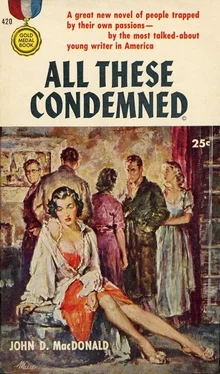
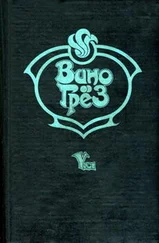
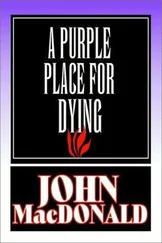
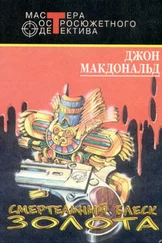
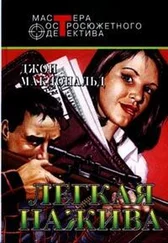

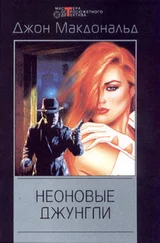
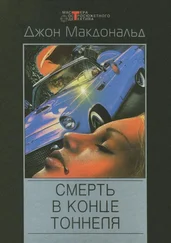
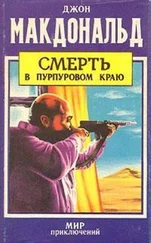
![Джон Макдональд - Wine of the Dreamers [= Planet of the Dreamers]](/books/430039/dzhon-makdonald-wine-of-the-dreamers-planet-of-thumb.webp)

